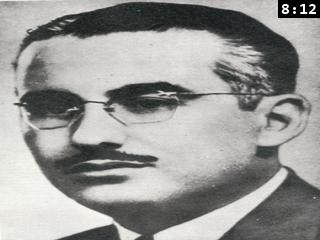However, things were not easier in the 1940s. Back then RHC Cadena Azul network, the first receiving the script considered its broadcasting inopportune –among other reasons- because the main character was a black woman. Later, some people considered it was not worthwhile broadcasting a play aimed at a lowbrow public, especially housewives.
When, finally, “El derecho de nacer” reached Villa Clara’s municipal radio stations even the workers leaned on the studious to listen to episodes they had missed at the broadcasting hours.
Years earlier, in the neighboring Sancti Spíritus, the Cinema Center of that province had taken advantage to increase its dwindling receipts with the screening of some film versions of the radio series.
“El derecho de nacer” of Radio Arte, was the original. It didn’t come misappropriated by the enemy. Wherever he might be, the author could laugh ironically, since time did him justice jn the same land he decided to rest in peace. He wanted to be admired for his songs –effectively valuable-, but he ended up amassing a fortune and applause for something different, or maybe similar: love and heartbreaking histories manifested in the manuscripts.
Félix B. Caignet’s works collects the essence of the 90 year-old radio. Postmodernists striving for labels and stirring up controversy over the artistic nature of the radio succumbed to eloquence.
In this regard, Caignet expressed with undeniable eloquence: “What I do is novel, simply novel, like the soul of the people.”
In the soul of people, as I say, the radio must be rooted since Rita Montaner’s voice stopped being exclusive of halls and theaters thanks to PMX.
Not long ago a friendly reporter confirmed how important the radio was after the passage of hurricane Sandy. Even the people who had no batteries for small receivers, went to the stations asking for information, or to recharge lamps and mobiles.
Sometimes treated with indifference, when discussions arise about the work of the media, the radio survives. Discreetly, it just finds its way into every home, at least letting the people know what time it is.
Fortunately, there are others looking for more: the weather forecast, sports, music. Sometimes it is turned on for the sake of making noise to soothe loneliness.
I remember how in the hardest moments of the Special Period, only two or three radio stations remained on the air after midnight. Then I went to bed listening to Radio Reloj. It seems crazy, but I wanted to be accompanied by those voices which fought off sleep in Havana studios rather than the perfect recordings of my favorite singer on a cassette or CD player.
The story makes evident an essential aspect of the radio: the intimate nature of the reception. Ten thousand people can tune in to the same program, but at the same time, each listener becomes personally attached to the message oblivious to that unknown mass of listeners in which every anonymous individual recognizes himself as sole interlocutor of an intimate dialogue.
No wonder, the great Orlando Castellanos predicted that the people would continue to tune unwittingly to discover the magic of the radio.
Despite the moments of contradiction or difficulty in which artists often see themselves, let us stay faithful to Caignet, to Luis Casas Romero, to Manolín, to Feliciano Reinoso, to the men and women who think positively, that the radio is not insane, or even better: that it is a transcendental insanity and that it is worthwhile going crazy for the pleasure of thinking how out of the simple confident space and the dramatic effect in the studios pitched battles can emerge, or how the voice inflection can cause hate, or tenderness without any scenography device, of wardrobe or makeup.
We are here, maybe by accident. Because we didn’t have to work this time of the day, or broadcast, because the radio is a nonstop work. Maybe you have just finished a good program, but a new one is coming in a few hours and that has to be better.
Congratulations to all of us for making the Cuban Radio. Let us wish it a long life and let us not feel challenged by the controversy over its artistic lineage…No matter if they say that “What we do is novel, simply novel…like the soul of the people.”
Translated by ESTI


